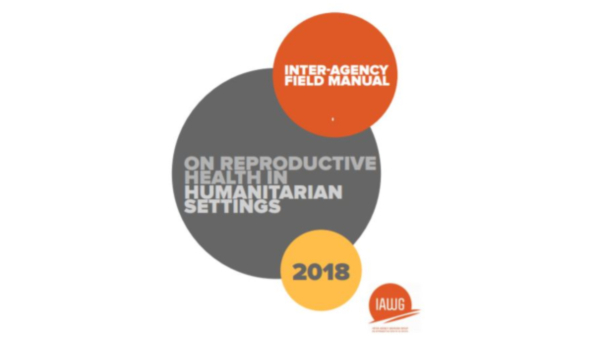
Minimum Initial Service Package for Sexual and Reproductive Health (MISP),
Inter-Agency Field Manual on Reproductive Health in Humanitarian Settings, 2018
The revised and updated Inter-Agency Field Manual on Reproductive Health in Humanitarian Settings was officially published in November 2018. Comprehensive abortion care, included for the first time, is covered in chapter 8, a completely new chapter. Although post-abortion care has always been included, this is the first time safe abortion care has been included at all. Provision of abortion and/or referrals for abortion care (to the full extent of the law) are included as an activity.
Different aspects of safe abortion care are included throughout the updated Minimum Initial Service Package (MISP) for the first time, which is Chapter 3 of the Manual. It outlines all aspects of sexual and reproductive health care to be provided in humanitarian settings. It now includes obligations to provide safe abortion care to all populations as soon as possible.
The MISP chapter also outlines the changes to the structure of the 12 essential reproductive health kits, which will be available at the end of 2019. These are ordered for population units of about 10,000 people, along with complementary medications and equipment. Among the medications and equipment listed as “complementary” (i.e. they can be ordered in specific circumstances) are misoprostol and mifepristone and hand-held vacuum-assisted delivery system (MVA), which can be used “where the use of the supplies is allowed to the fullest extent of the national law”. Misoprostol and MVA are already included in several of the core RH kits. 2019 will be the first time that mifepristone will be available as well. Work to facilitate importation of abortion-related supplies is ongoing. There will be settings where it will be easier to bring in misoprostol or MVA equipment as part of the core kits for primary care or tertiary care facilities; the new kit structure will allow these options.
Chapter 8 on abortion covers:
- Programming information on comprehensive abortion care and provision of or referral to such services
- Basic clinical information to guide service delivery
- A framework to obtain accurate information and understand the administrative and regulatory context related to abortion in the setting where they are working
- An understanding of the social, cultural, and religious norms surrounding safe abortion care
- Tools to educate communities on their rights and policymakers on their duties
This detailed infographic is a synopsis of the MISP chapter in the Manual.
[Editor’s note: The phrase “to the full extent of the law” was put into the 1994 ICPD Programme of Action by anti-abortion advocates, to sabotage making safe abortion a requirement where it is unsafe. It may serve as a let-out clause now too. Even so, the new additions to the MISP and the Field Manual are a major advance by the IAWG. Congratulations!



